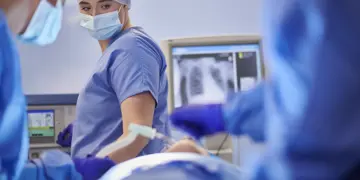Call to suspend recruitment of PA and AAs
Call to suspend recruitment of PA and AAs
‘Shocking testimony’ exposes administration of inappropriate procedures threatening patient safety
Patient safety is being put at risk by a ‘dangerous free-for-all’ regarding the use of PA (physician) and AA (anaesthesia associates) in the NHS, the BMA has warned.
The association has today reiterated its calls to suspend the recruitment of PAs and AAs in the health service, as ‘shocking testimony’ from hundreds of doctors and medical students has revealed the extent to which patient safety is being placed at risk.
In a submission to the Government-commissioned Leng Review into the use of associate professionals, the BMA has provided more than 600 accounts from students and doctors which reveal how PAs and AAs are working beyond their remit and competence.
Examples include PAs diagnosing patients without doctor supervision or knowledge, prescribing inappropriate treatments and introducing themselves as a registrar to other staff and patients.
One harrowing account submitted to the BMA by a resident doctor working in the South Thames region, detailed how they had had to intervene after a PA unsuccessfully attempted to perform an arterial blood gas procedure on a patient.
Horror story
The doctor said: ‘They [the PA] said they were fully trained to do so and would be glad to help. I then watched with horror as they started doing strange things to the patient’s wrist with a needle. I therefore asked them if they had done the procedure before, and they said they had done so many times.
‘It appeared to me that they were lying, as there was no other explanation for the strange things they were doing to the patient – they were harming an unconsenting, critically ill patient that desperately needed resuscitation from competent doctors but were only making the patient worse.'
As a result of the findings the association is demanding that recruitment and expansion of associate professional roles be halted and that a BMA-designed safe scope of practice and supervision guidance be introduced across the NHS.
Unsupervised procedures
The BMA is also calling for an urgent investigation into PAs and AAs being placed on doctor rotas, with BMA council chair Philip Banfield warning that the first-hand accounts of doctors grimly illustrated the reality of how associate staff were being misused.
He said: ‘We have long talked about “patient safety”, “scope of practice”, and competencies. Now this shocking testimony shows precisely what these words mean on the ground.
‘PAs inserting chest drains unsupervised, prescribing dangerous levels of opioids to patients or even those outright impersonating doctors – the sheer number of these accounts is hair-raising.’
He added: ‘These testimonies are of critical importance to Professor Leng’s impending review which must end this dangerous free-for-all.’
Commissioned by the health secretary Wes Streeting, the Leng Review seeks to examine the current use of PAs and AAs in the NHS and ‘consider the safety of the roles and their contribution to multidisciplinary healthcare teams’ going forward.
Recommendations arising from the review are expected to feed into and inform the forthcoming NHS workforce plan, which the Government is set to publish later this year.
Another resident doctor working in the East of England reported how a PA at their workplace attempted to prescribe a potentially dangerous treatment after misdiagnosing a patient.
They said: ‘The physician associate independently diagnosed pemphigus (an extremely rare disease) and independently prescribed high dose oral steroids.
‘This patient clinically had varicella zoster or herpes simplex infection. This is a straightforward diagnosis that most GPs could confidently make. High dose oral steroids was very inappropriate and can cause significant morbidity and even mortality in the context of varicella zoster.
‘I spoke with the PA and he confirmed that he never discussed the patient with a supervising GP.’
Fear of reprisal
Totalling more than 600 in number, the testimonies were sent to the BMA through an online portal between November 2023 and February 2025.
While the association instructed doctors to also submit their concerns via reporting systems in their workplace, Prof Banfield, in his introduction to a report on the testimonies, said that too many doctors still felt unable to speak out.
He said: ‘Doctors consistently tell us that formal patient safety reporting mechanisms are complex and insufficient. Many doctors continue to be afraid of raising safety concerns in the workplace for fear of reprisal.
‘The current situation is unfair on all staff, including physician and anaesthesia associates, but most importantly unfair for patients and their families. Healthcare system leaders must take responsibility for patient safety, take note of this large body of evidence and act to ensure that unsafe practice is not happening in their own organisations.
‘Doctors are instructed by their regulator to act promptly when patient safety or dignity is, or may be, seriously compromised. It is time that the leaders of regulators and providers are held to the same standard.’




